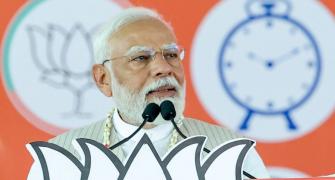Global majors like GE, Westinghouse, Areva, Mitsubishi, and Hitachi have been making the rounds of the Indian nuclear establishment to check out the possibility of collaboration with various domestic players.
Representatives of these companies have, in fact, held several rounds of talks with the Nuclear Power Corporation, according to senior executives of the corporation.
Among domestic players, National Thermal Power Corporation, L&T, Reliance Energy, and the Tata group have been in consultations with NPCIL on the modalities of setting up nuclear power plants in the country, and possible collaboration, since, under the current legislative regime in the country, nuclear power plants can be operated only by a company in which the central government holds 51 per cent equity.
This means a collaboration with either NTPC or NPCIL for private and foreign players. While the Tata group and L&T have expertise in design and construction of nuclear power plants, other domestic players such as REL and NTPC will be starting out from scratch. Both companies have set up separate divisions to handle the sector.
Foreign players such as GE, Westinghouse, and Areva will ensure the entry of advanced technologies such as Advanced Heavy Water Reactors and light water reactors, which are currently not available in India.
India also lacks expertise in the bigger reactor varieties. The average size of Indian reactors is 200 Mw, while worldwide nuclear reactor capacities have gone up to 700-1000 Mw.
NPCIL is already in discussions with suppliers in Russia, France, UK and US for four such reactors, pending the ratification of the Indo-US nuclear deal.
Companies with nuclear ambitions will, however, have to wait until the end of next year, which is the time it will take to put the entire enabling legal framework in place.
This includes a reconciliation of the versions of the bill passed by the US Congress and the Senate and the final passing of the bill, its ratification by the Nuclear Suppliers Group, and the International Atomic Energy Agency's ratification of the proposed safeguards.
Industry experts said the first reactors under the new regime could become operational only by 2014, given that the average period of construction and testing for a nuclear power plant is 6-8 years.
The Indian government also needs to pass amendments to the Atomic Energy Act of 1948, allowing the participation of private and foreign players. The government has already circulated a draft amendment to the Act.
However, the more immediate benefit of the treaty would be in the enhanced fuel supply regime, which could commence six months after the legalities were in place, experts said.
This, they pointed out, would mean better capacity utilisation of the 14 civilian nuclear reactors, which are currently operating at 60 per cent for shortage of fuel. With imported fuel, the power plants can be operated at 90-95 per cent capacity.








